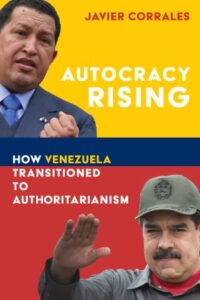In Autocracy Rising, he explains why and how Venezuela, which enjoyed periods of democratically elected governments in the latter half of the twentieth century, descended into autocratic rule, highlighting two themes – party systems and institutional capacity:
Venezuela’s democratic backsliding advanced when the ruling party obtained far too much electoral clout while the opposition fragmented. The state then took control of formerly independent agencies of the state. This allowed the ruling party to use and abuse of the law to favor the president—which in turn generated a permanent economic crisis.
Extremist policies provoke or intensify polarization, which in turn, can help backsliding presidents consolidate support and, paradoxically, weaken the opposition, adds Corrales, a Journal of Democracy contributor. Such policies, together with polarization, help presidents achieve backsliding.
 Maduro is a dictator that has established a narco-oppressive regime that has destroyed all forms of institutional and socioeconomic development, notes H.E. Iván Duque Márquez, a Distinguished Fellow at the Woodrow Wilson Center and a former President of Colombia (2018-2022). As a consequence, more than 6 million people have left the country, triggering the most challenging migration crisis in the history of Latin America.
Maduro is a dictator that has established a narco-oppressive regime that has destroyed all forms of institutional and socioeconomic development, notes H.E. Iván Duque Márquez, a Distinguished Fellow at the Woodrow Wilson Center and a former President of Colombia (2018-2022). As a consequence, more than 6 million people have left the country, triggering the most challenging migration crisis in the history of Latin America.
The idea of allowing Maduro to set the terms and conditions of the dialogues with the democratic resistance in exchange for allowing US oil companies to drill in Venezuela is going to be used by the regime to remain in office while any democratic hope is destroyed, he writes for the Wilson Center’s Moments of Clarity: Uncovering Important Lessons for 2023.

 How Nicolás Maduro reinvented authoritarianism for the twenty-first century is the subject of a new book from Amherst College professor
How Nicolás Maduro reinvented authoritarianism for the twenty-first century is the subject of a new book from Amherst College professor 





